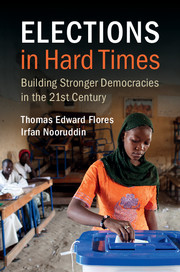Book contents
- Frontmatter
- Dedication
- Epigraph
- Contents
- List of figures
- List of tables
- Preface
- Part I From Elections to Democracy: Theory and Evidence
- Part II Challenges Facing Elections in Developing Countries
- 4 The Ephemeral Power of Contingent Legitimacy
- 5 Experience Matters: Democratic Stock and Elections
- 6 Starved States: Fiscal Space and Elections
- 7 Violent Votes: Conflict and Elections
- Part III Democracy Promotion for the Twenty-first Century
- Appendix A Data Appendix: Sample, Variables, Sources
- Appendix B Main Statistical Results
- Notes
- Bibliography
- Index
7 - Violent Votes: Conflict and Elections
from Part II - Challenges Facing Elections in Developing Countries
Published online by Cambridge University Press: 05 September 2016
- Frontmatter
- Dedication
- Epigraph
- Contents
- List of figures
- List of tables
- Preface
- Part I From Elections to Democracy: Theory and Evidence
- Part II Challenges Facing Elections in Developing Countries
- 4 The Ephemeral Power of Contingent Legitimacy
- 5 Experience Matters: Democratic Stock and Elections
- 6 Starved States: Fiscal Space and Elections
- 7 Violent Votes: Conflict and Elections
- Part III Democracy Promotion for the Twenty-first Century
- Appendix A Data Appendix: Sample, Variables, Sources
- Appendix B Main Statistical Results
- Notes
- Bibliography
- Index
Summary
Journalists and political observers like to describe elections in combative terms. Elections pit candidates and political parties in “campaigns” in which they “fight” for votes, particularly in tightly contested “battleground” states or provinces. Candidates hopefully can access a large “war chest” to finance their campaigns. An uneven election might be described as a “rout,” in which one side deals another a “crushing defeat.” The use of militaristic metaphors to describe elections should not surprise us; elections by their very nature involve a contest for political power. The promise of democracy is in part the replacement of irregular war with regular elections, bullets with ballots, and armies with political parties. Democracy does not eradicate humans’ relish for political combat, but the hope is that it channels that competition into a commitment to peaceful political campaigns.
It is therefore ironic that elections have increasingly been held in the shadow of organized political violence. The electoral boom spread elections to countries scarred by successive waves of civil conflict. The incidence of civil conflict exploded after the mid-1950s, from a low of only 6 percent of sovereign states in 1955 to a high of nearly a quarter in the early 1990s, just as the electoral boom took shape. The electoral boom often found itself spreading to conflictual societies. Nearly two of every five elections during the electoral boom took place in countries either mired in civil conflict, as in Colombia, or within ten years of one, as in post-war Liberia and Cambodia. The electoral milieu also more frequently featured ethnic strife. Only 5.5 percent of elections were held while an ethnic war occurred in the 1960s; by the 1990s, that proportion had nearly tripled.
Quite clearly, the specter of organized political violence has become an unwelcome yet common feature of the electoral environment over the last thirty years. Scholars have suggested that this trend is no mere coincidence. They argue that elections surged precisely because the international community more frequently acted on two preferences. First, the United Nations and other organizations, particularly after the publication of An Agenda for Peace in 1992, committed themselves to a more robust portfolio of preventive diplomacy, conflict mediation, and post-war peacebuilding. Conflicts that ended in the 1990s consequently were far more likely to be ended through peace talks held under the aegis of the United Nations and other international organizations.
- Type
- Chapter
- Information
- Elections in Hard TimesBuilding Stronger Democracies in the 21st Century, pp. 144 - 170Publisher: Cambridge University PressPrint publication year: 2016



